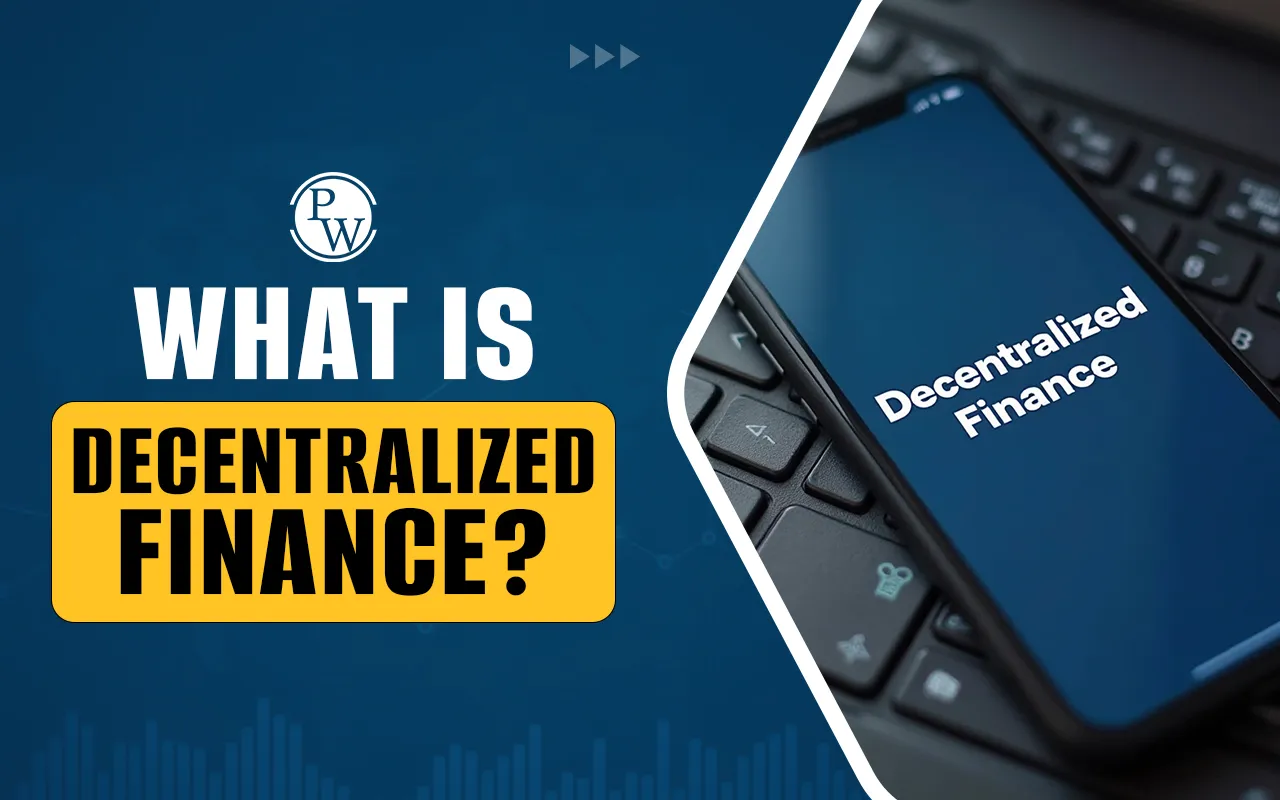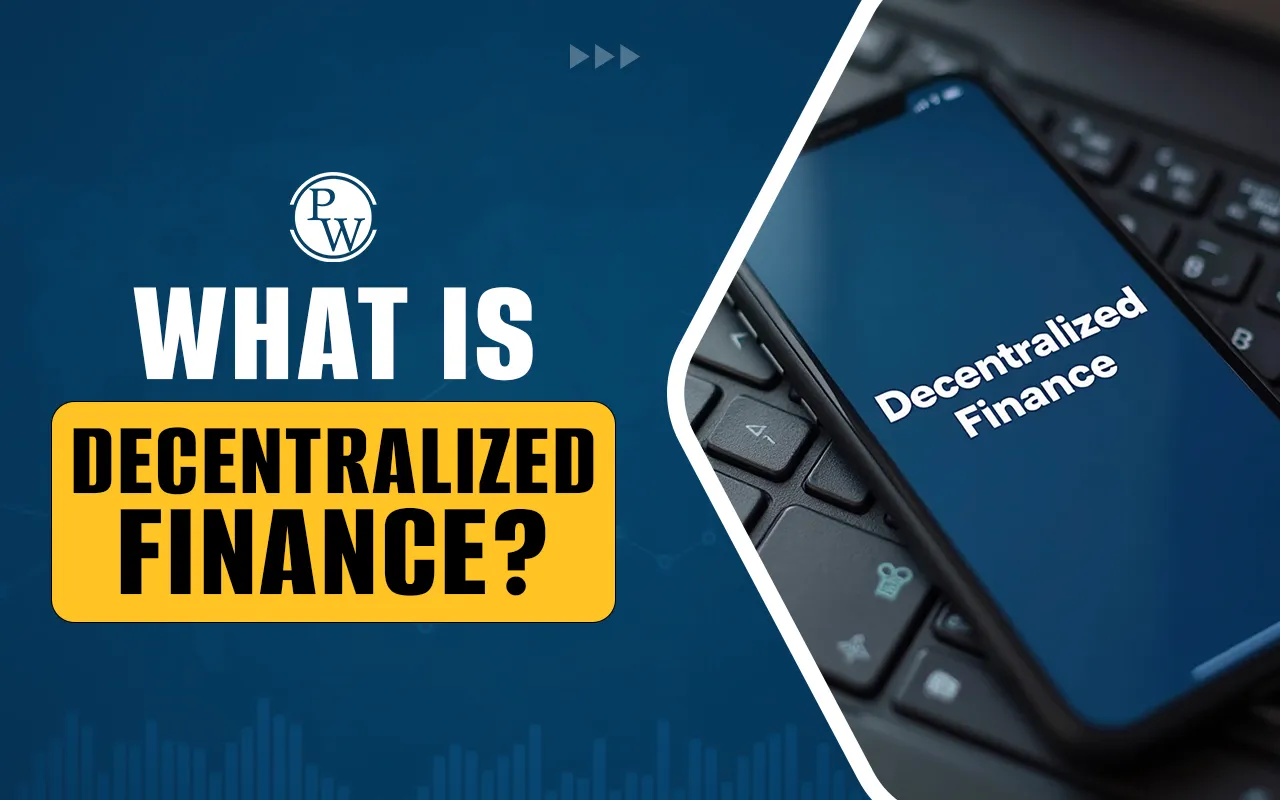

Decentralized Finance (DeFi): Ever thought of sending money, making payments, or investing, without a bank in between? That’s the idea behind decentralized finance, or DeFi. Built on blockchain, DeFi removes traditional intermediaries like banks and brokers, enabling direct, peer-to-peer financial transactions.
For anyone new to the concept, this guide explains what DeFi is and how it works. Through smart contracts and decentralized apps (dApps), DeFi offers secure, transparent, and low-cost alternatives to conventional finance.
Whether you’re exploring DeFi for beginners or planning to build a career in finance, understanding its uses, benefits, and risks is essential in today’s digital economy.
What is Decentralized Finance?
Decentralized finance (DeFi) is a blockchain-based system that enables financial activities like lending, borrowing, trading, and investing without involving banks or intermediaries. It operates through smart contracts—self-executing codes that automate transactions—on public blockchains. DeFi's meaning includes direct peer-to-peer access, global participation, and user control through digital wallets.
For example, instead of taking a loan from a bank, users can borrow digital assets through DeFi protocols. This system reduces costs, increases transparency, and is accessible to anyone with an internet connection, making it a flexible and inclusive alternative to traditional financial systems.
How Decentralized Finance Works?
Decentralized finance (DeFi) works by using blockchain technology and smart contracts to offer financial services without traditional intermediaries like banks or brokers. Here's how it functions step by step:
1. Based on Blockchain Technology
At the core of decentralized finance is blockchain, a digital ledger that records all transactions across a network of computers. Once a transaction is verified, it is permanently recorded and linked to previous blocks. This system ensures transparency, security, and prevents tampering.
Most DeFi systems operate on blockchains like Ethereum, which support smart contracts and decentralized applications.
2. Smart Contracts Handle Transactions
Smart contracts are self-executing codes stored on the blockchain. They carry out actions like lending, borrowing, or trading automatically when certain conditions are met.
These contracts remove the need for middlemen. For example, instead of a bank approving a loan, the smart contract does it based on predefined rules.
3. Peer-to-Peer Financial System
DeFi enables direct transactions between users, also known as peer-to-peer (P2P). Whether it's sending money, lending crypto, or trading assets, users interact directly with each other through the blockchain — no approval from a centralized institution is needed.
4. Access Through Decentralized Applications (dApps)
Users engage with decentralized finance through dApps, which provide a user-friendly interface to interact with smart contracts. These apps let users:
- Lend or borrow crypto
-
Trade digital assets
-
Earn interest
-
Manage funds securely
There’s no paperwork or bank account needed — just a crypto wallet.
5. User-Controlled Assets
In DeFi, users hold full control of their digital assets. Access to funds is secured by private encryption keys, which stay with the individual. This setup avoids the need to trust a third party with your money.
Therefore, decentralized finance works by combining blockchain, smart contracts, and peer-to-peer technology to offer fast, secure, and open financial services — all while giving users full control over their assets.
Read More - Financial Intermediary: Definition, Types, and How It Works
Practical Uses of Decentralized Finance (DeFi)
Decentralized finance offers a wide range of financial services without involving traditional banks. It uses blockchain technology and smart contracts to provide open, secure, and peer-to-peer financial solutions. Here are some of the main uses of decentralized finance:
- Peer-to-Peer Lending and Borrowing: DeFi platforms allow users to lend their crypto and earn interest or borrow assets without lengthy approval processes. This peer-to-peer model removes the need for intermediaries.
-
Decentralized Trading: Users can trade cryptocurrencies directly with each other through DeFi applications, without the need for a central authority. These trades are fast, secure, and transparent.
-
Yield Farming and Liquidity Pools: In yield farming, users deposit their crypto into liquidity pools and earn rewards. These pools support smooth trading and offer passive income opportunities to participants.
-
Digital Payments and Transfers: DeFi enables fast, low-cost transfers of digital assets across borders. It supports person-to-person payments without relying on traditional systems.
-
Stablecoins for Price Stability: DeFi uses stablecoins—cryptocurrencies linked to the value of stable assets like fiat currencies—to reduce price fluctuations and make everyday transactions more reliable.
-
Asset and Wallet Management: DeFi apps give users full control over their digital assets. Users can store, manage, and transfer crypto securely without needing a third-party service.
-
Prediction Markets and Blockchain Gaming: Some DeFi platforms support prediction markets and blockchain-based games where users can participate using crypto, combining finance with interactive experiences.
-
NFTs and Asset Tokenization: DeFi supports non-fungible tokens (NFTs) and tokenized assets, allowing for digital ownership, collection, and fractional investment in real-world or digital items.
This list covers the main use cases of decentralized finance, especially helpful for those exploring DeFi for beginners.
Top 10 Benefits of Decentralized Finance
Decentralized finance, or DeFi, is transforming how people access and use financial services. It offers several advantages over traditional systems by removing intermediaries and relying on blockchain technology and smart contracts. Here are ten major benefits of decentralized finance:
1. Full Control Over Assets:
In DeFi, users hold their own crypto wallets and private keys, meaning they maintain complete control over their assets. Unlike traditional banks, where funds are stored by third parties, DeFi allows direct ownership.
For example, a user can store funds in a decentralized wallet and access them anytime without needing a bank.
2. Open and Permissionless Access:
Anyone with an internet connection can use DeFi services—no bank account, approval, or documentation required. This opens access to financial tools globally, especially for the unbanked or underbanked population.
For example, a farmer in a rural area can access crypto loans or send payments without a local bank.
3. Low Transaction Costs:
Without middlemen like banks or brokers, DeFi platforms usually offer much lower transaction fees. Smart contracts automatically execute transactions, reducing administrative expenses.
For instance, transferring money through a DeFi app can cost just a few cents, compared to high wire transfer fees in traditional banking.
4. Transparency and Auditability:
All transactions in DeFi are recorded on public blockchains. Anyone can view smart contract codes and transaction history, increasing trust and reducing the chances of fraud.
For example, users can check decentralized lending protocols to see how much cryptocurrency is being borrowed or deposited in real time.
5. Fast and Flexible Transactions:
DeFi transactions are processed almost instantly, with no waiting for business hours or manual approvals. Users can send, receive, borrow, or lend money anytime.
For example, a user can lend crypto on a DeFi platform and start earning interest within minutes.
6. Better Interest Rates and Earning Opportunities:
DeFi platforms offer higher yields through methods like staking, yield farming, or liquidity provision. Unlike savings accounts in banks, these returns are often significantly higher.
For example, depositing a stablecoin like USDC into a decentralized finance liquidity pool can earn an annual return of around 5%–10%, which is often higher than the returns offered by most traditional fixed deposit accounts.
7. Interoperability Between Applications:
Most DeFi apps are built on blockchains like Ethereum, allowing them to work together smoothly. Users can move assets between platforms or combine services easily.
For example, a user can borrow funds from one DeFi platform and invest in another without leaving the ecosystem.
8. Anonymity and Privacy:
DeFi does not require users to share personal details such as names, email IDs, or ID proofs. This protects user identity while still enabling full functionality.
For instance, a trader can use decentralized exchanges to buy or sell tokens without completing KYC.
9. Innovation and Rapid Development:
DeFi is a fast-growing space with constant innovation. New financial tools, tokenized assets, insurance, and even DeFi-based gaming are emerging regularly.
For example, Flash loans—instant, no-collateral loans—are a unique innovation made possible only in the DeFi ecosystem.
10. Global Financial Inclusion:
DeFi brings access to financial services for individuals in countries with unstable banking systems or limited infrastructure. It allows global participation in a borderless way.
For example, people living in countries with inflation can convert their local currency into stablecoins through DeFi to protect their savings.
These benefits of decentralized finance highlight how DeFi is changing traditional financial systems by offering open, efficient, and transparent alternatives.
Major Risks of Decentralized Finance
Decentralized finance (DeFi) provides various opportunities, but it also comes with several risks that users and investors must be aware of. Here are ten major risks associated with DeFi:
1. Bugs in Smart Contracts:
DeFi apps run on smart contracts—self-executing code on the blockchain. If there's even a small bug in the code, it can be exploited by hackers to steal funds.
For instance, a contract meant to transfer tokens to a user might send them to the wrong address due to faulty logic. Unlike traditional systems, there's no central body to reverse such transactions.
2. No Safety Net for Losses:
Traditional banking systems may offer insurance or protection, but in decentralized finance, there's no regulatory backing. If a DeFi project fails or is hacked, your money could be gone forever. There's no institution to file complaints with or recover funds from.
3. Risk of Hacking and Theft:
Hackers are constantly trying to exploit DeFi platforms. Since these platforms deal with large sums and don’t have a central security team, they are vulnerable.
For example, users storing crypto in a decentralized wallet must protect their private keys—losing them means losing access permanently.
4. Unpredictable Regulations:
DeFi operates globally but without global rules. Since it’s unregulated in many regions, sudden legal changes can affect how a DeFi app functions. A country might ban certain crypto activities, which can impact users overnight.
Also, it's unclear who investigates frauds that happen across multiple countries.
5. Volatile Markets:
Cryptocurrencies are highly volatile. In a single day, the price of tokens used in DeFi could rise or fall dramatically. If you’ve deposited your crypto in a DeFi lending app, a sudden price drop might lead to the liquidation of your assets.
6. Liquidity Problems:
DeFi apps often rely on user-supplied liquidity to function. If many users withdraw their assets at once, the platform might not have enough left for others to cash out. This can delay withdrawals or force users to accept much lower prices.
7. Fluctuating Gas Fees:
DeFi transactions often require gas fees, especially on popular blockchains. These fees can rise sharply during high traffic periods.
For example, swapping tokens or joining a lending pool may cost more than the expected profit, especially for smaller investors.
8. Complex User Experience:
Interacting with decentralized finance requires using wallets, managing keys, and understanding protocols. For beginners, this complexity can lead to mistakes.
Sending funds to the wrong address or misunderstanding how a liquidity pool works can result in lost funds.
9. Dapps May Fail or Vanish:
Many DeFi apps are still experimental. If the team behind a project walks away, the app may stop updating or lose user trust. Even if the smart contract still runs, there’s no one maintaining or improving it. Investors left in such platforms can find it hard to withdraw or move funds.
10. Oracles Can Be Manipulated:
DeFi apps often rely on oracles—tools that feed real-world data into smart contracts. If an oracle gives wrong or delayed information (e.g., incorrect token price), it can trigger wrong actions like unfair liquidations or price mismatches in trades.
Decentralized finance is expanding quickly, offering users more control over their money without relying on traditional banks. However, with opportunities come risks—such as code vulnerabilities, lack of legal protection, and unpredictable market swings. Staying informed and making careful investment choices is essential.
Understanding DeFi also gives professionals an edge in finance, fintech, and blockchain roles. As this space continues to grow, knowledge of decentralized systems and tools can open up strong career paths in the digital finance sector.
Build Practical Finance Skills with the PW Financial Modeling Course
The PW Financial Modeling Course with Deloitte Academy helps you learn financial analysis, budgeting, forecasting, and investment planning through live sessions and practical case studies. Over 3 months, you'll work on industry projects and receive a recognized certification to boost your finance knowledge.
Start learning with the PW Financial Modeling Online Course – Sign up today!
FAQ
What is decentralized finance in simple words?
What is DeFi and how does it work?
What does DeFi mean for beginners?
Can you give an example of decentralized finance?
Is DeFi safe to use?
Is decentralized finance a good career option?













